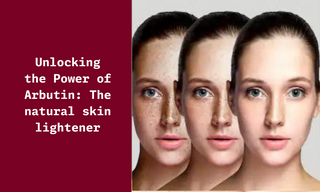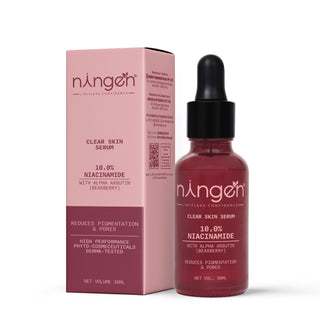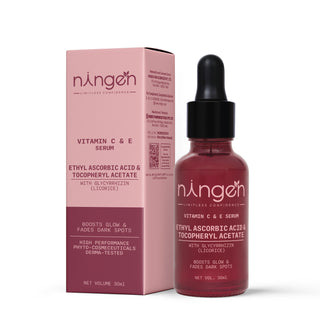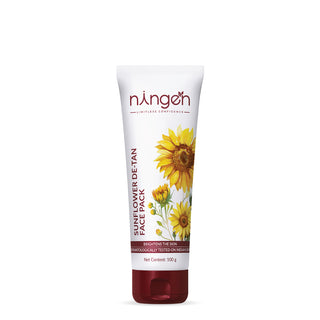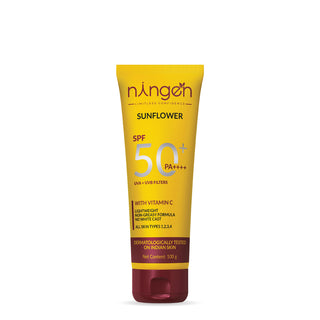Get ready to glow naturally!
In this blog, we're diving into the magic of Arbutin, the ultimate skin lightener. If you've been dreaming of a brighter, more radiant complexion without harsh chemicals, you're in for a treat. Let's unlock the secrets of this natural wonder and discover how Arbutin can bring out your skin's inner glow. Say goodbye to dullness and hello to luminosity – it's time to embrace the power of Arbutin, the natural skin lightener.
What is Arbutin?
Arbutin is a natural ingredient that helps make your skin brighter. It's like a little helper that works to lighten spots and even out your skin tone. If you want a more radiant and even complexion, Arbutin is here to lend a hand gently!
Arbutin is a naturally occurring compound found in various plants, including bearberry, blueberry, and cranberry. It is often used in skincare products for its skin-brightening and dark spot-reducing properties.
Arbutin works by inhibiting the production of melanin, the pigment responsible for the color of our skin. This can help to reduce the appearance of dark spots, hyperpigmentation, and uneven skin tone.
Arbutin can be found in various skincare products, including serums, creams, and lotions. When using products containing arbutin, it is important to use sunscreen during the day, as the skin may become more sensitive to UV rays.
Types of Arbutin
Arbutin is a natural compound found in various plant species, and it is commonly used in skincare products for its skin-lightening and brightening properties. There are several different types of arbutin, each with its unique characteristics and benefits.
- The most common type of arbutin is alpha-arbutin, which is considered to be the most effective form for skin lightening. Alpha-arbutin is a water-soluble form of arbutin that is easily absorbed by the skin, making it highly effective at reducing the appearance of spots and hyperpigmentation. It is also considered to be more stable and less likely to cause skin irritation compared to other forms of arbutin.
- Beta-arbutin is another form of arbutin that is found in certain plant extracts. While it is similar to alpha-arbutin in terms of its skin-lightening properties, beta-arbutin is considered to be less stable and less effective at penetrating the skin. However, it is still a popular ingredient in many skincare products for its ability to even out skin tone and reduce the appearance of age spots.
There is also a synthetic form of arbutin, known as deoxyarbutin, which is created through a chemical process. Deoxyarbutin is considered to be a more potent form of arbutin, as it has been shown to have higher melanin-inhibiting activity compared to other forms of arbutin. However, there is some controversy surrounding the safety of deoxyarbutin, as some studies have suggested that it may have potentially toxic effects on the skin.
Sources of Arbutin
Arbutin is a natural compound found in a variety of plant sources. It is commonly used in skincare products due to its potential skin-lightening and brightening properties. If you are looking to incorporate this ingredient into your beauty routine, it's helpful to know where you can find it.
One of the most well-known sources of arbutin is the bearberry plant, also known as uva ursi. The leaves of the bearberry plant contain a high concentration of arbutin, making it a popular choice for natural skincare products. Additionally, other plants such as pear, cranberry, and blueberry also contain arbutin, although in smaller amounts.
Another source of arbutin is the mulberry plant. Mulberry extract is often used in skincare formulations for its skin-brightening properties, and it is a rich source of arbutin. Additionally, certain types of mushrooms, such as shiitake and reishi, contain arbutin and are used in traditional medicine for their skin-protective and anti-inflammatory effects.
In addition to plant sources, arbutin can also be synthesized in a laboratory setting. This synthetic arbutin can be found in many commercial skincare products and is often used as a safer alternative to hydroquinone for skin lightening.
Whether you choose to use arbutin from natural plant sources or opt for a synthetic version, it's important to look for products that are formulated with high-quality ingredients. With its potential skin-brightening effects, arbutin can be a valuable addition to your beauty regimen.
The Role of Arbutin in Skincare
Arbutin is a natural compound that is gaining popularity in the skincare world for its skin-brightening and anti-aging properties. Derived from the bearberry plant, arbutin has been used for centuries in traditional medicine for its ability to lighten and even out skin tone. In recent years, it has become a key ingredient in many skincare products.
- One of the main benefits of arbutin is its ability to inhibit tyrosinase, an enzyme that plays a key role in the production of melanin. Melanin is the pigment responsible for giving skin its color, and an overproduction of melanin can lead to uneven skin tone, hyperpigmentation, and age spots. By inhibiting tyrosinase, arbutin helps to reduce the production of melanin, leading to a brighter and more even complexion.
- In addition to its skin-brightening effects, arbutin also has anti-aging properties. It has been shown to inhibit the formation of wrinkles and fine lines by preventing the breakdown of collagen and elastin, two proteins that are essential for maintaining the firmness and elasticity of the skin. This makes arbutin an excellent ingredient for those looking to combat the signs of aging and maintain a youthful appearance.
- Arbutin is also a gentle and non-irritating ingredient, making it suitable for all skin types, including sensitive skin. It is considered a safe alternative to other skin-brightening ingredients, such as hydroquinone, which can cause irritation and sensitivity in some individuals.
What Causes Hyperpigmentation, Dark Spots, and Uneven Skin Tone?
Hyperpigmentation, dark spots, and uneven skin tone can be caused by various factors, including:
-
Sun Exposure: Prolonged exposure to the sun's harmful UV rays triggers the production of melanin, leading to dark spots and uneven skin tone.
-
Hormonal Changes: Fluctuations in hormones, especially during pregnancy or birth control use, can result in melasma, a type of hyperpigmentation often appearing as dark patches on the face.
-
Inflammation: Skin injuries, acne, or other inflammatory conditions can stimulate melanin production during the healing process, causing post-inflammatory hyperpigmentation.
-
Aging: As the skin ages, cell turnover slows down, and accumulated sun exposure becomes more evident, contributing to the development of dark spots and an uneven complexion.
-
Genetics: Some individuals may be genetically predisposed to developing hyperpigmentation or having a more uneven skin tone.
-
Certain Medications: Some medications, like certain antibiotics or chemotherapy drugs, may increase sensitivity to sunlight, leading to pigmentation issues.
-
Skin Irritation: Harsh skincare products or frequent exfoliation can irritate the skin, potentially causing dark spots and uneven tone.
Understanding these causes helps in adopting preventive measures and choosing suitable skincare products to address specific concerns. Sun protection, a consistent skincare routine, and avoiding skin irritants are essential steps in maintaining a more even and radiant complexion.
How Arbutin Fades Dark Spots & Hyperpigmentation?
Arbutin is known for its ability to fade dark spots and hyperpigmentation through a series of skin-brightening mechanisms. Here's how Arbutin works to promote a more even skin tone:
-
Inhibits Melanin Production: Arbutin inhibits the activity of an enzyme called tyrosinase, which plays a key role in melanin production. By slowing down this process, Arbutin helps reduce the amount of melanin produced, leading to a lighter appearance.
-
Blocks Tyrosinase Activation: Tyrosinase activation is crucial for the synthesis of melanin. Arbutin interferes with this activation, disrupting the formation of pigment and contributing to the gradual fading of hyperpigmentation.
-
Brightening Effect: Arbutin promotes a more even skin tone by brightening existing spots. It works gently on the skin, making it suitable for those with sensitive skin who may be prone to irritation from other potent brightening agents.
-
Addresses Sun-Induced Pigmentation: Arbutin is particularly effective against sun-induced pigmentation. It helps prevent and reduce the appearance of dark spots caused by prolonged exposure to UV rays, making it a valuable addition to sun-damaged skin care routines.
-
Stabilizes Pigment Production: By stabilizing melanin production, Arbutin contributes to long-term improvements in hyperpigmentation. It assists in maintaining a balanced and consistent skin tone over time.
It's important to note that while Arbutin is a potent ingredient for addressing hyperpigmentation, results may vary from person to person. Consistent use of skin care products containing Arbutin, along with sun protection measures, can contribute to a more radiant and even complexion over time. As with any skincare ingredient, a patch test is recommended before widespread use, and consulting with a dermatologist can provide personalized advice for addressing specific skin concerns.
Note: Check out our article on Niacinamide, which can also help fade hyperpigmentation.
How to Integrate Arbutin into Your Skincare Routine?
If you are looking for a natural way to brighten and even out your skin tone, arbutin may be just the ingredient that you need. Derived from the bearberry plant, arbutin is a natural skin-brightening agent that has been used for centuries in traditional medicine. When integrated into your skincare routine, arbutin can help fade the darkening of skin, hyperpigmentation, and acne scars, leaving your skin looking more radiant and youthful.
To effectively integrate arbutin into your skincare routine, it is important to understand how to use it properly. Here are some tips for incorporating arbutin into your daily regimen:
- Choose a suitable product: Look for skincare products that contain arbutin as one of the main ingredients. This could include serums, creams, or lotions. Make sure to read the product labels and choose a reputable brand that uses high-quality arbutin.
- Cleanse your skin: Before applying any arbutin-based products, it is important to start with a clean canvas. Use a gentle cleanser to remove any dirt, oil, and makeup from your skin.
- Apply arbutin products: After cleansing, apply a small amount of arbutin serum or cream to your skin. Gently massage the product in and allow it to absorb fully before applying any additional skincare products.
- Use sunscreen: Arbutin can make your skin more sensitive to the sun, so it is crucial to use sunscreen every day. Look for a broad-spectrum sunscreen with an SPF of at least 30, and reapply it throughout the day if you will be spending time outdoors.
- Be patient: Like many skincare ingredients, arbutin takes time to show results. It may take several weeks or even months of consistent use to see a noticeable improvement in your skin tone and texture.
- Consider combining with other brightening agents: To enhance the effects of arbutin, you may want to consider using it in conjunction with other skin-brightening ingredients such as vitamin C or niacinamide. These ingredients can help to amplify the brightening effects of arbutin and improve overall skin tone.
Incorporating arbutin into your skincare routine can be a game-changer for those looking to fade skin darkening and achieve a more even complexion. By following these tips and being consistent with your routine, you can effectively integrate arbutin into your skincare regimen and enjoy the benefits of brighter, more radiant skin.
Discover our curated selection of recommended products containing Arbutin in the section provided.
The Takeaway
We hope our exploration of Arbutin, the natural skin lightener, has been enlightening. We've discovered its powerful ability to gently fade skin darkening, address hyperpigmentation, and enhance overall radiance.
Arbutin's unique capacity to inhibit melanin production and promote an even skin tone sets it apart in skincare. Through our investigation into its mechanisms, it's clear that this natural wonder offers hope for those desiring a brighter complexion.
As you integrate Arbutin into your skincare routine, remember that patience and consistency are key. This journey to radiant skin is a gradual process, emphasizing the gentle yet potent nature of Arbutin. It stands as a beautiful example of harnessing nature's gifts for skincare.
Here's to unlocking the power of Arbutin – a path toward naturally radiant, lightened, and luminous skin. Embrace the glow, appreciate your skin, and revel in the brilliance of this natural skin lightener. Your radiant journey awaits!
Frequently Asked Questions(FAQ'S)
Question1: What is Arbutin, and how does it work on the skin?
Answer: Arbutin is a natural skin-lightening ingredient that inhibits melanin production, promoting a more even skin tone.
Question2: Is Arbutin suitable for all skin types?
Answer: Yes, Arbutin is generally well-tolerated by various skin types, including sensitive skin.
Question3: How long does it take to see results with Arbutin?
Answer: Results can vary, but noticeable improvements may be observed after consistent use over several weeks.
Question4: Can Arbutin be used with other skincare ingredients?
Answer: Yes, Arbutin is compatible with many other skincare ingredients. It can be safely combined with a variety of products.
Question5: Is Arbutin effective for all types of hyperpigmentation?
Answer: Arbutin is particularly effective for various types of hyperpigmentation, including sunspots and post-inflammatory hyperpigmentation.
Question6: Can Arbutin be used during pregnancy or breastfeeding?
Answer: Arbutin is generally considered safe for use during pregnancy and breastfeeding. However, consulting with a healthcare professional is advisable.
Question7: How often should I incorporate Arbutin into my skincare routine?
Answer: Arbutin can be used daily, either in the morning or evening, depending on your preference.
Question8: Does Arbutin make the skin more sensitive to sunlight?
Answer: Arbutin itself does not make the skin more sensitive to sunlight. However, using it in conjunction with sunscreen is recommended for overall skin health.
Question9: Can Arbutin be used on acne-prone skin?
Answer: Yes, Arbutin is generally well-tolerated by individuals with acne-prone skin and can help address post-inflammatory hyperpigmentation.
Question10: Are there any side effects associated with Arbutin use?
Answer: Arbutin is considered safe for most users. However, some individuals may experience mild irritation. Performing a patch test before widespread use is recommended.


